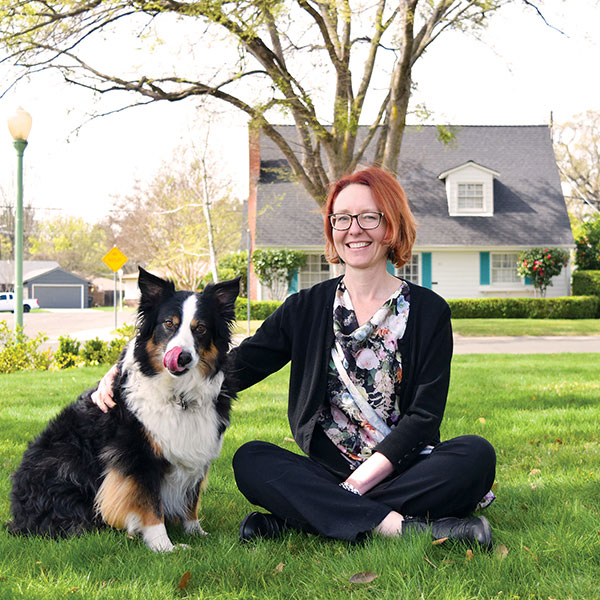Power to the Pets
Sacramento renters face lack of affordable animal-friendly housing
By Cathryn Rakich
April 2020
When the owner of a Tahoe Park rental home abruptly sold the house, Kelly Cunningham and her 37-pound Australian shepherd mix found themselves unexpectedly searching for a new place to live.
“I started looking for housing and was completely dismayed,” Cunningham says. “There was a scarcity in rentals that would take pets, specifically a 37-pound dog.”

Cunningham learned of a pet-friendly rental house near Tahoe Park, complete with a dedicated dog area in the backyard. “I arrived after work during the open house and the agent told me I would have had to arrive at the start. She was already buried in applications and my likelihood of getting the place was next to nothing.”
Cunningham inquired about other possibilities. “The agent said, ‘We have no other pet-friendly homes in our system’”—a system with approximately 200 dwellings for rent.
“The lack of pet-friendly rentals is a problem,” says David Dickinson, director of the Sacramento County Animal Shelter on Bradshaw. “Responsible owners need options for rentals.”
A search on the real estate database Zillow finds 1,260 available rental homes, condos, townhouses and apartments in Sacramento County. Of those, 499 allow cats, 524 small dogs and 173 large dogs (the definition of small and large dogs varies by rental property).
In the 994 square miles that make up Sacramento County, approximately 14 percent of rentals allow large dogs. “I don’t consider 37 pounds a very large dog,” Cunningham says. “But so many draw the line with a small dog or one pet only.”
Available housing options show landlords and management agencies tend to be more amiable to felines and small canines. “Cats can be easily litter box trained and typically do not do damage to dwellings,” Dickinson says. “Dogs are also easily house trained.”
After about two months of “worrying and searching,” Cunningham finally landed a duplex in River Park. “At first the landlord said no to dogs.” Due to a strong referral from the friend who rents the other half of the duplex, the landlord agreed to an interview.
Renters have to become animal advocates, Cunningham says. Start by suggesting a pet interview. “Make an appointment and bring the dog. If you have a certificate of behavior training, bring it.” Cunningham also recommends a letter of referral from past landlords.
“If you lapsed on training with your dog, get back to basics,” with commands like sit, down and stay. “Make sure your dog is ready for the interview,” she says.
Also, offer to add a statement to the lease agreement that the renter will pay for damages caused by the animal. “If something happens in a house you’re renting, be honest and up front and repair that damage with the landlord’s permission,” Cunningham says. “Be a good renter. A good dog citizen. A good dog advocate.”
As the dog foster coordinator for the East Sacramento-based rescue group Happy Tails Pet Sanctuary, Cunningham has firsthand experience with pet owners facing a lack of affordable housing.
Requests to surrender animals to Happy Tails has increased over the last two years, she says. “There were a lot of requests in 2019. People having to move. People in tears who cannot find housing they can afford that allows animals. That’s been a conversation I’ve had over and over again,” she says.
“If you think you have to part ways with your animal, you need to plan ahead,” she adds. “Contact rescue groups or make an appointment at the SPCA right away.”
The Sacramento SPCA, which mainly accepts owner-surrendered pets, tracks the reasons why people give up their companion animals. In 2019, 255 cats (19 percent of total feline surrenders) and 468 dogs (24 percent of canine surrenders) were given up due to housing-related issues, including foreclosures, homelessness, inadequate houses or yards, landlord rules and moving.
“Sacramento is rated as one of the most dog-friendly cities in the nation, yet housing is still one of the top reasons why animals are surrendered by their owners,” says SSPCA CEO Kenn Altine. “As Gov. Newsom boldly pushes to end euthanasia of adoptable or treatable pets in California’s shelters, we must address the reasons why they are entering shelters, including housing-related issues.”
Newsom’s inclusion of $50 million in his 2020-21 budget proposal to help California become a “no-kill” state has won praise and skepticism among animal advocates. “If Gov. Newsom’s investment in California becoming a no-kill is going to be successful, then we’ve got to change the way landlords and building owners look at pet ownership. And also help renters understand their rights and obligations,” Cunningham says.
“Lack of pet-friendly housing is a major reason for pet abandonment and relinquishment to animal shelters,” according to the No Kill Advocacy Center, which offers model legislation to prohibit housing discrimination against people with animal companions. “As long as reasonable concerns about pets are addressed—such as a deposit against damage—the privilege of living with a dog, cat or other animal should not be reserved to those fortunate enough to own their own home.”
With pet-friendly housing comes an additional monthly rental charge, as well as an often-hefty pet deposit. The Zillow search found prices for pet-friendly rentals ranging from $925 a month for a one-bedroom apartment to $5,000 a month for a six-bedroom home.
With all the new multi-unit housing being built in Sacramento, Cunningham is hopeful there will be more affordable options for people with companion animals. “Landlords are a huge part of the issue. By saying no to animals, they are ending up in the shelters and rescues. These animals are the unseen victims.”
“Landlords have all the power,” Cunningham adds. “They have to recognize pets as family. They are saying no to someone’s emotional support. Money cannot be the sole factor.”
Cathryn Rakich can be reached at crakich@surewest.net. Follow us on Facebook, Twitter and Instagram: @insidesacramento.















